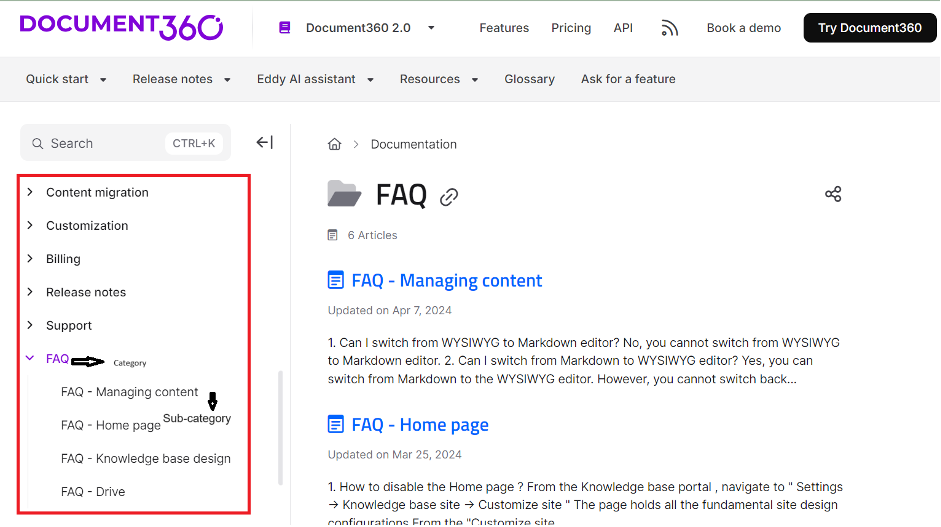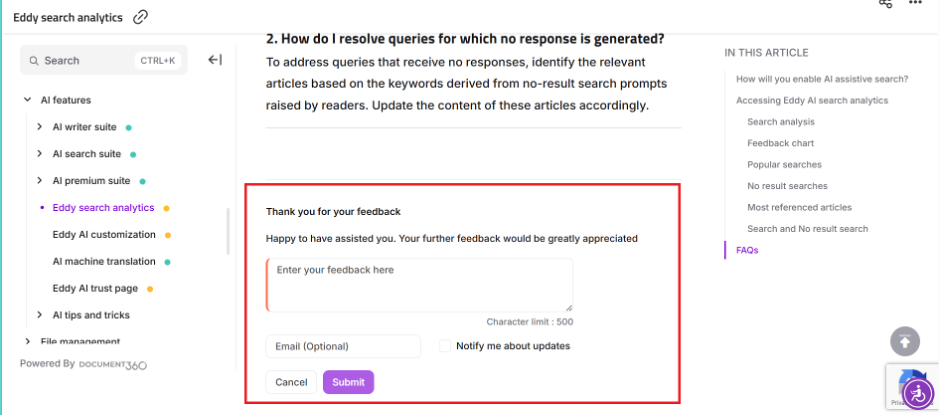FAQ stands for Frequently Asked Questions; as the acronym suggests, it’s the most asked and demanding part of your business website. Having an online FAQ page helps you convert users.
Especially for problem-aware and solution-aware buyers.
Therefore, it’s important to frame your FAQ page accordingly with the right content.
In this blog, we’ll help you understand why you should build an online FAQ page from the intent perspective of B2B buyers.
Let’s dive in.
Why are FAQs important for your business?
FAQs are the most important marketing and sales assets your business will ever have. They help your buyers make the final call about whether to buy your services, and FAQ pages work wonders post-sales as well. They work in a duo—they reflect the buyer’s decision and also help them with self-service capabilities after buying.
Often, a few highlights of the landing page are missed by the readers. We generally assume that our readers read everything; FAQ pages help to repeat the key details that you don’t want your readers to miss.
Here are four reasons stated that show how FAQs are super important for your business;
● Improves Customer Self-Service
Focus on providing an exceptional customer experience. FAQs are proof of an economically feasible tactic for providing support to your customers in self-serve mode.
A well-structured FAQ page can house all the essential details your customers might require at any time, accessible with just a few clicks. To achieve this, consider using a knowledge base platform where you can upload and organize all your FAQ content. Once it’s live, your customers can easily find answers without needing to reach out for support, enhancing their overall experience.
● Free Up Customer Service Agents
After talking to sales and customer support departments, FAQ questions are carefully designed, and businesses can manage low-priority tickets with them. It frees up your customer service agents to focus on creating better workflows, learning new contact center technology, and other self-development tasks, or, in parallel, working on high-priority issues.
It builds a responsive and agile support environment. Carefully optimize your resources, and make a better place to work for your agents.
● Build Trust and Customer Loyalty
Your FAQs page makes your business responsive and customer-focused. No customer would handle a customer support queue well. 49 percent of customers withdrew their loyalty due to poor CX. Customers can find answers without waiting by providing self-service strategies such as FAQ pages. All these conveniences build more trust and loyalty.
● Address Customer Concerns quickly
68% of customer support leaders focus on offering customer support using better tools to solve issues independently. Knowledge base software like Document360 allows businesses to create FAQ pages quickly and update content, edit, manage, and publish on autopilot mode. This way, your customer doesn’t have to wait and get their concern sorted at Godspeed.
| Pro tip: Ask prospects why they haven’t developed other solutions. That’s where you’ll learn what the four most asked questions are for your business. |
Tips for creating an effective FAQ page
● Categorize and arrange FAQs logically
Organize FAQs into distinguished categories. Make it easily spotted by the customers so they don’t have to navigate and spend screen time finding particular answers. Create categories and subcategories if your business glossary is vast and each feature is multifunctional. Group similar questions to avoid clutter.

● Use clear and concise language
Use simple, minimal, neat writing techniques without any fluff. If you’re using industry jargon, explain it further. To write effectively, use AI tools for writing and editing. Document360 provide an inbuilt AI writer available with a WYSIWYG editor for doing specific actions like ‘make shorter’ and ‘improve it’.
● Enable quick information retrieval with search functionality
Incorporate a search bar on your FAQ page to allow users to find specific answers quickly. You can add AI to increase search flexibility on your online FAQ page. It provides contextual answers to reader queries and prompts. This feature is essential for enhancing user experience and making your page more user-friendly.
● Use Visuals and Tutorials
Don’t write text-heavy where possible, complement your FAQs with visuals like images, infographics, or videos. Tutorials can be particularly helpful for complex topics, providing a step-by-step guide that’s easier to follow. You can easily insert videos in the Document360 editor and make it live without worrying about slow loading speed, broken links, and eros.
● Gather feedback & Update FAQs frequently
Keep your online FAQ page two-way; don’t just post content but also accept customer requests like new product features and enhancements, and let customers share feedback on articles.

Keep your online FAQ page interactive by adding upcoming feature announcements, development, and other plans ( keep customers in the loop).
Final Words
Use the FAQ page link as the CTA whenever sending customer support emails and other touchpoints such as social media, newsletters, and customer onboarding.
Make your customer feel approachable. The FAQ page on the business website speaks on behalf of your support team, so make sure you customize it to drip value and provide actionable steps to your customer. Addressing common objections proactively on your FAQ page will improve your conversion rate.
Using any KMS software will help you speed up processes like publishing, updating the latest information, and iterating across departments.
Lynn Martelli is an editor at Readability. She received her MFA in Creative Writing from Antioch University and has worked as an editor for over 10 years. Lynn has edited a wide variety of books, including fiction, non-fiction, memoirs, and more. In her free time, Lynn enjoys reading, writing, and spending time with her family and friends.















